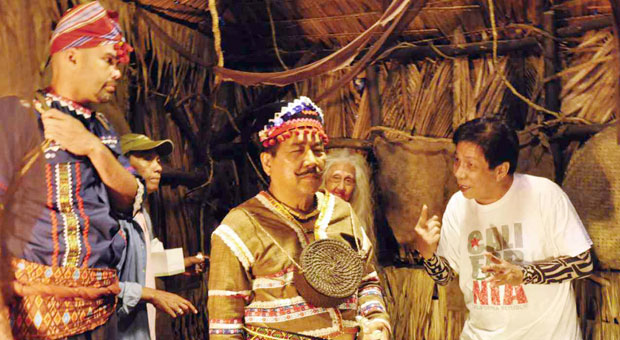Return of ‘Ibong Adarna’

JUN URBANO (right) directs a scene with Leo Martinez (center) and Benjie Paras, and Lilia Cuntapay (background).
“The goal is to get as many students as possible to watch it,” said actor-director Jun Urbano of his adaptation of “Ibong Adarna.”
The 18th-century epic about a magical bird is required reading material for high-school freshmen. The first film version in 1939 had Victor Salumbides as director and Urbano’s late father, Manuel Conde, as technical supervisor. The movie starred Fred Cortes and Mila del Sol. In 1955, Conde remade it in color. A version by Pablo Santiago was released in 1972, starring Dolphy and Rosanna Ortiz.
“I’m fortunate to have made the fourth version,” said Urbano, who is seeking the endorsement of the Department of Education and the National Commission for Culture and the Arts. He would like his “Ibong Adarna: The Pinoy Adventure” to tour schools and universities around the country before the year ends.
“The movie is finished. It’s an honest-to-goodness and sincere film, worth viewers’ hard-earned money,” Urbano told the Inquirer. “I hope that, for students, it would feel like watching (the Hollywood adventure movie) ‘Indiana Jones.’”
Urbano said he made sure that today’s Filipino youth could relate to the script. “It’s very Pinoy, featuring a sultan instead of a king, the aswang, the nuno sa punso and the Haribon, or Philippine eagle, among others,” he explained. “The sultan’s sons journey from their kingdom in Mindanao to find the Adarna in Mountain Province in Luzon. Thus, the film showcases the beauty of the country.”
Article continues after this advertisementRocco Nacino plays the youngest of three princes who try to save their dying father (played by Joel Torre), by bringing the Adarna to sing to him.
Article continues after this advertisementLeo Martinez plays the scheming half-brother who casts a spell on the sultan with the aid of a wicked witch (portrayed by Lilia Cuntapay). Angel Aquino plays the sultan’s wife; Gary Lising, the nuno sa punso; and comedian Kuhol, the angry giant.
Binibining Pilipinas 2012 candidate Karen Gallman plays the Adarna.
Urbano said finding the perfect backdrop for the film was a major hurdle. “It is set before the Spanish occupation. We needed a location that hadn’t been seen in any other period movie. We found just that in San Pablo, Laguna. We used the area surrounding one of the Seven Lakes as the sultan’s kingdom.”
Other sets were in Tanay, Rizal; Calatagan, Batangas; Mountain Province and Quezon.
The long and difficult process of animation was another challenge, said Urbano. “It took us six months to complete the animated Haribon, giants and nuno sa punso.”
“Ibong Adarna” is Urbano’s answer to a clamor that he perceives for unique and sensible film projects. “Sadly, industry people nowadays think only of making money. I see the movies being produced today and end up asking, is this all that we can come up with?”
Another epic
He is confident of his movie’s chances against mainstream local productions. “People just need to know there’s such a film,” he said. “I hope audiences will like it, and that it will make some profit. I have another story in mind—about the last great ruler of Manila, Rajah Sulayman. I’m into epic films; I guess I got this from my father.”
Urbano, also a writer, popularized the character Mr. Shooli of the comedy series “Mongolian Barbecue.” Conde directed the classics “Genghis Khan” (1950) and the “Juan Tamad” series (1947-1963).
(E-mail the author at [email protected])